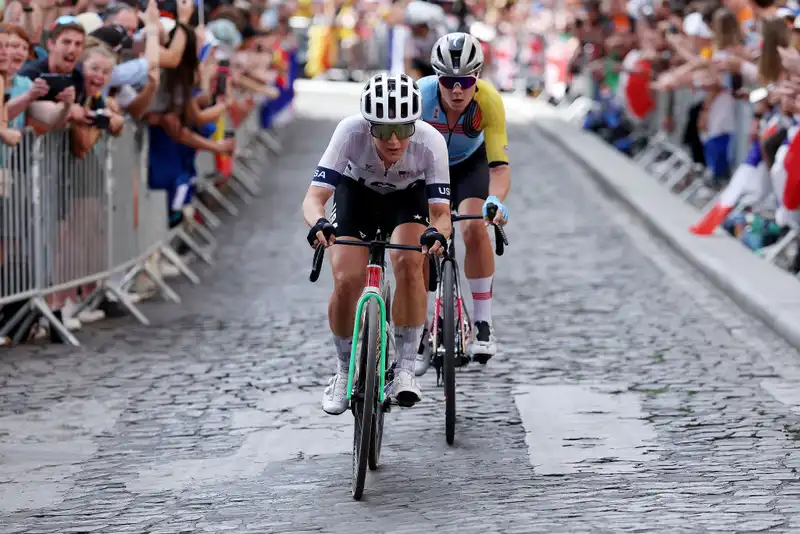Two thrilling road races unfolded at the Paris Olympics, with the women's race in particular being decided with 4 km to go. The open and dynamic racing was due in part to the small team sizes, but also largely to the lack of race radios, which forced the riders to figure out what to do on their own.
The radio debate is expected to heat up again as the UCI will introduce a test of race radio regulations in three stages of the Vuelta a Burgos and Tour de Pollogne (August 12-18), which begin on Monday.
After the Olympic women's road race, bronze medalist Lotte Kopecky (Belgium) spoke in favor of racing without radios.
"It's not like racing with a team radio. You have to feel more how the race is going. You have to follow your instincts. As a rider, I like it a lot. I think it's a very honest way to fight." [Gold medalist Christine Faulkner (USA) and silver medalist Marianne Vos (NL) agreed.
"I think without the radio, more race tactics and race instincts are required of the riders," Faulkner said. 'What are all the riders doing, how tired are they, what are the team tactics, who's riding for whom, who's taking the bottle for whom?'
"I like it. I think it's more fun and it makes the game more intelligent about what's going on."
Voss said he doesn't think it would be much different without the radio. He said, "But sure, you almost have to pay attention, you have to think for yourself.
Procycling has wrestled with the race radio debate for over a decade. Opponents say it makes racing boring, predictable, and turns riders into robots; the UCI tried to ban race radios from low-level races in 2010, but WorldTour teams threatened a boycott and successfully defended their use, citing rider safety concerns.
Teams used safety aspects to keep radio communications open. The Dutch Rabobank team claims that when Pedro Horrillo crashed into a ravine in the 2009 Giro d'Italia, the radio saved his life. If teammate Jos van Emden had not been able to call in the crash immediately, Horillo might not have lost his life.
On the other side of the debate, there is a more esoteric rationale in favor of the radio ban. A French team, familiar with cycling's history and with a culture that embraces the glitz and self-directed aspects of the sport, says that "the security argument is a fraud" and that the constant push from supervisors for riders to move up the order before critical points poses more safety problems than radio would solve
stating that it causes more safety problems than the radio solves.
However, pro racing teams are large enough and riders travel back and forth to team cars for information and strategy advice that banning radios may not have the intended effect.
Part of the appeal of the Olympics is the quirky combination of smaller teams, riders outside the usual pro peloton, and smaller pelotons.
"It makes the race interesting and really difficult," said one competitor. 'It's different from any other race and the dynamics are different. It has a different appeal than the Olympics. It's great to have the Olympics in Paris and have the best athletes in the world racing around the iconic monuments of Paris."


Comments